Sewing Thread
This week we will take a look at sewing thread. Remember-Look for the Blog Reader’s only coupon for a special discount on all thread at Rocky Mountain Sewing.
Thread is the most important piece of any sewing project. It’s the “glue” that holds your project together. Beyond holding it all together, thread is also a major decorative element of any project. The outcome of your creative sewing journey depends on your thread choice! Whether you are quilting, crafting a home dec item, stitching a garment, or machine embroidering, the correct thread can take your finished project from so-so to fabulous! So you should know your threads and choose wisely.
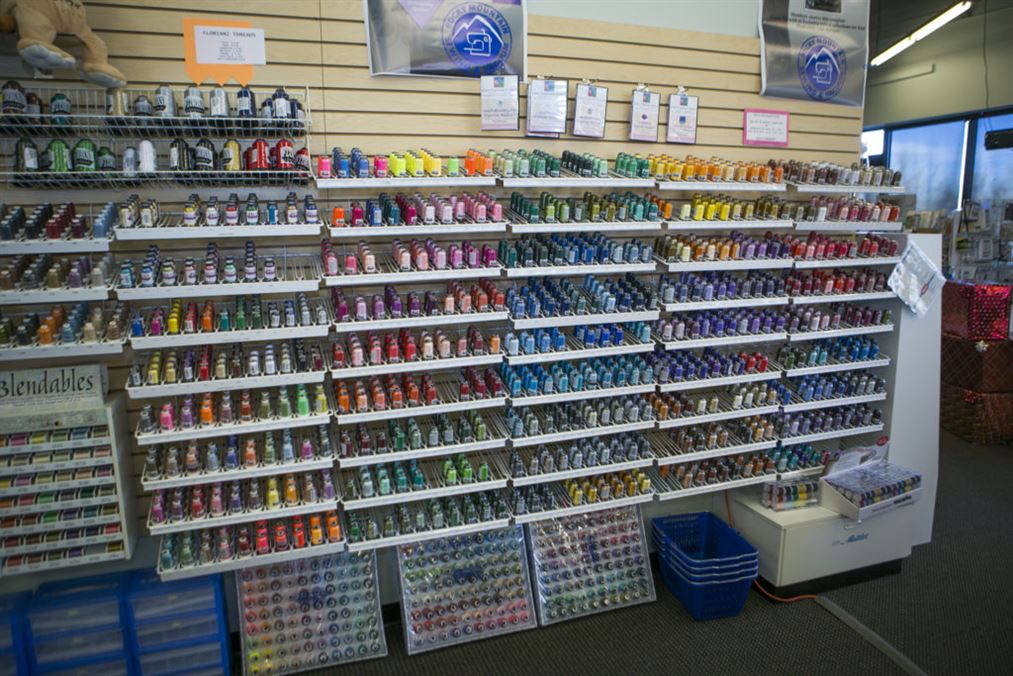
Types of Sewing Thread
Thread is available in different fibers for a reason! Fiber content is the most important thing to pay attention to when choosing thread for your project. Your project and fabric determine the thread type you should use.
- Thread is available in Polyester, Cotton, Rayon, Nylon, Wool, Monofilament, Acrylic, and Metallic fibers. Spools may be found in a combo of these fibers or as 100% single fiber type.
- Cotton produces more lint, has limited stretch, shrinks when washed, and fades more than man-made fibers.
- Polyester has good stretch and recovery, low lint, can be bleached, and won’t shrink.
- Rayon is made from cellulose fibers- a natural plant material. It produces much lower lint than cotton and holds color better thus is brighter to the eye. Yet it can shrink, has limited stretch, and tends to “bleed” color.
- Monofilament often looks and feels like fishing line or plastic. There is no lint with monofilament. This thread is mostly used for non-wearables since it tends to be scratchy.
- Know your fiber strengths. For example: Polyester is a much stronger thread than cotton or rayon.
- Cotton, or cotton wrapped polyester, is the preferred thread for quilting because it glides easier through fabric, batting, and needle eyes. Plus, it provides a real homespun, handmade look to your quilt.
- It’s okay to match thread fiber with fabric fiber – EXCEPT in garment and home dec construction where thread strength is important. When strength and durability is a concern, then the thread fiber choice should be polyester.
- Some brands offers similar threads in different fiber content.
- Metallic should be used as a decorative thread only.
- Machine Embroidery works best with thread specifically made for this technique.
Let us know how we are doing. We want to hear from our readers. Please post a comment at the end of the blog.
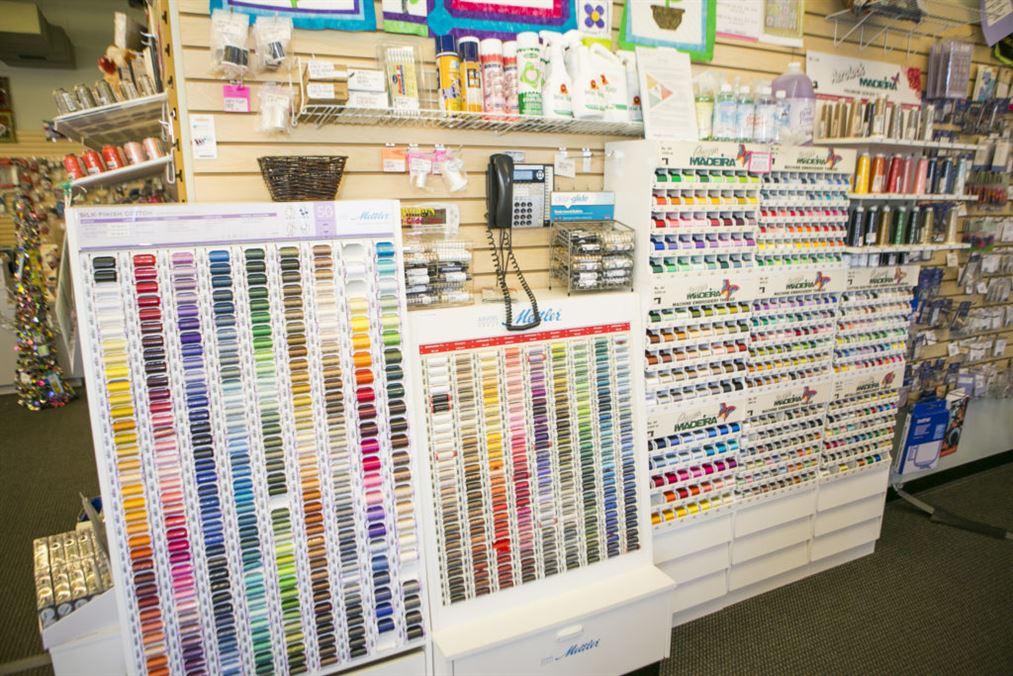
Sewing Thread Sizing
The thread size also has an impact on the quality of the finished project. The size is clearly marked on the thread spool. Note: Needle sizes and thread sizes are totally different. So don’t match needle size to thread size. For example: If plan to use a size 12 needle for your project, then choose a 30 or 40 wt. thread instead of 12wt thread.
- Most thread sold in the United States is sized by weight using a number followed with the symbol “wt.”
- The larger the number, the THINNER the thread. So 12 wt. thread is much thicker than 40wt. thread.
- The wt. means that a certain length or yardage of this thread is required to actually weigh one gram or one kilogram, etc. This “standard” can vary among manufacturers but is not usually noticeable. Thus – 40 wt. polyester in one brand my be slightly thinner or thicker than another brand.
- Tex is a sizing standard being applied more and more . There is a push for Tex to become the universal thread sizing standard. Tex is stated as a 3 digit number followed by a “T”. Also, the Tex sizing system is reversed of the “wt.” sizing system. With Tex: the larger the number, the thicker the thread.
- Most thinner threads are either polyester or rayon.
- A good general rule to choose thread size: Choose thinner or lighter thread if your fabric is lightweight. Choose a thicker or heavier thread if your fabric is heavy. For machine embroidery, the standard is typically 40 wt. If the design is dense, then try a 30 wt. instead.
[coupon couponid=”10515″ coupon_align=”cctor_alignnone” name=”25% off ALL Thread”]
Sewing Thread TIPS
- ALWAYS TEST the sewing thread for colorfastness before stitching your project. Do this by stitching with the thread on a small scrap of either your project fabric, or another fabric scrap you have on hand. Then wash the scrap as you would the finished project.
- Check thread manufacturer websites for laundering instructions. Most spools do not contain this information. Your dealer may have a pamphlet with this info. Ask for it when you purchase your thread.
- Thread quality is important. Beware of “generic” thread. Better to pay a little more for a known brand than to end up with a ruined project.
- If the thread you choose breaks or stitches skip, check tension and needle. Thicker threads require less tension than thinner threads. Make sure your bobbin thread matches the upper thread. Always use a new needle for every project.
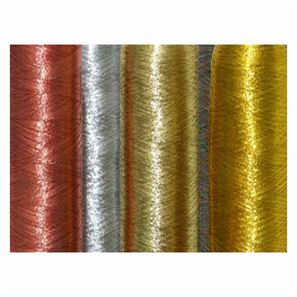
- Metallic threads tend to break easy and are more difficult to stitch. Use a general, all purpose, polyester thread in the bobbin with Metallic threads. Choose a needle labeled “Metallic” or a Titanium coated needle. Try a slightly larger needle size than you normally would use with a polyester thread.
- Lower the upper tension when using Monofilament thread. Try a Teflon coated needle, or spray your needle with a silicon spray lubricant before stitching with monofilament thread. This will help prevent breakage and skipped stiches. (Do NOT spray while the needle is in the machine. Remove needle and spray in a well ventilated area away from your machine over a sink or newspaper.)
- Look for thread to match your technique : Hand Quilting thread, Jeans thread, and Topstitching thread are just a few of the technique specialty sewing threads available.
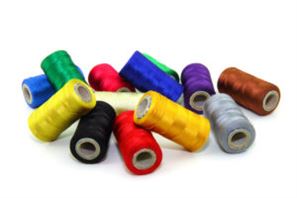
Tell Us How We are Doing
We want to hear back from you, our customers. Is there a subject on sewing, quilting, needle arts, crafting, etc. that you would like to see featured in the future? We love getting feedback and comments. Also, we like to answer questions. So please, post a comment or ask a question at the bottom of this article. We want to know how we’re doing and if there is any way to improve on our website.
Classes and Offers
Looking to learn a new technique? Interested in a quilting class? Want to know how to use your machine? Trying to figure out inserting a zipper? Then check out the class selection at Rocky Mountain Sewing and Vacuum. We offer all types of classes. We even offer FREE machine usage classes no matter where you purchased your!!!!! If you don’t see a class your looking for on our calendar, LET US KNOW.
We have 3 locations in the greater Denver area as well as one in Colorado Springs. Our friendly and cheerful staff is ready to assist you and answer any questions you may have on sewing and vacuums! In addition to sewing, we also know vacuums. You can even schedule a one on one vacuum session to get the most out of your vacuum. So please, stop in and see what we’re all about. Sign up to get email offers and our newsletter:
Special Offers: Get special deals on sewing machines
Sewing Thread and Other Notions Available at Rocky Mountain Sewing
In addition to sewing machines and vacuums, Rocky Mountain Sewing has a complete selection of sewing thread and other notions. You will find needles, quilting supplies, machine embroidery supplies, stabilizer, sewing machine feet and accessories, and much more. We also have vacuum cleaner replacement bags and filters, belts, etc.
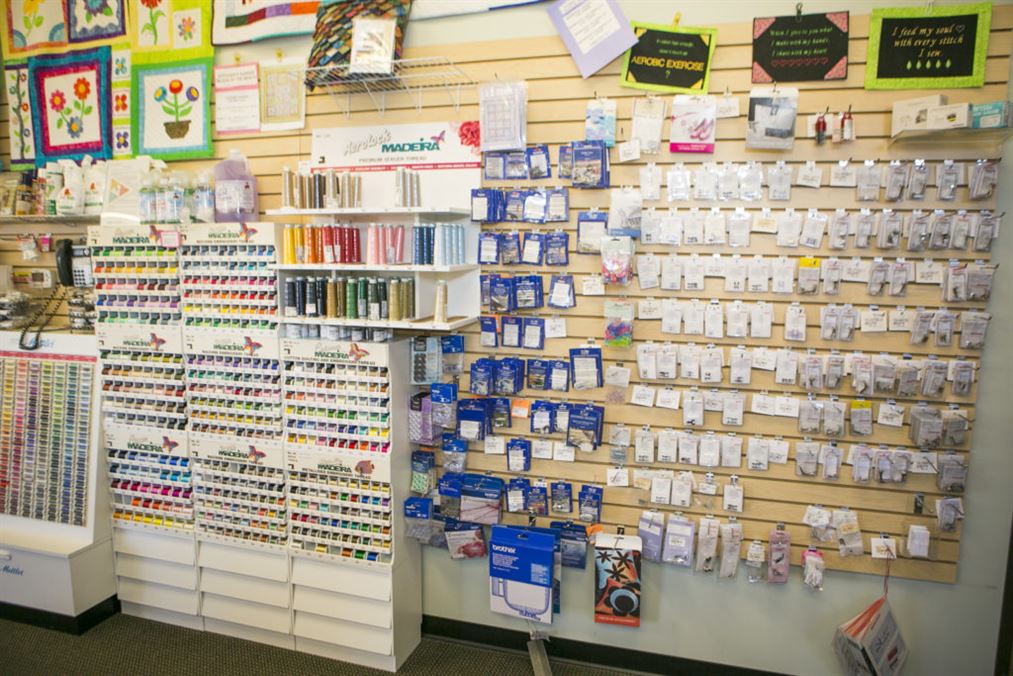

Comments
Cathy Ellsaesser
Debbie, your message was a little garbled, so I’m not too sure what you were asking. However, it looks like you are in Oakland, CA and we are in Denver CO. I am not aware of locations out there that could help you, but suggest you check out some of your local sewing or quilting shops.
Debbie Barlogio
Can you ask around for help with my dream have new sewing threads mix colors threads cross stitch Fabrics with pictures idont have much school special class can you ask around for help with my dream have sewing threads supply debbie barlogio 9939 gouldst Oakland ca946032344
cmorelli
Kay, I am glad you liked the article. If you’re a quilter, then you might also be interested in the one I just posted on batting. Please let me know if there is anything about sewing/crafting/quilting you would like to see on our website. And please ask questions anytime!
Thanks for the feedback.
Kay Robison
Great Info!